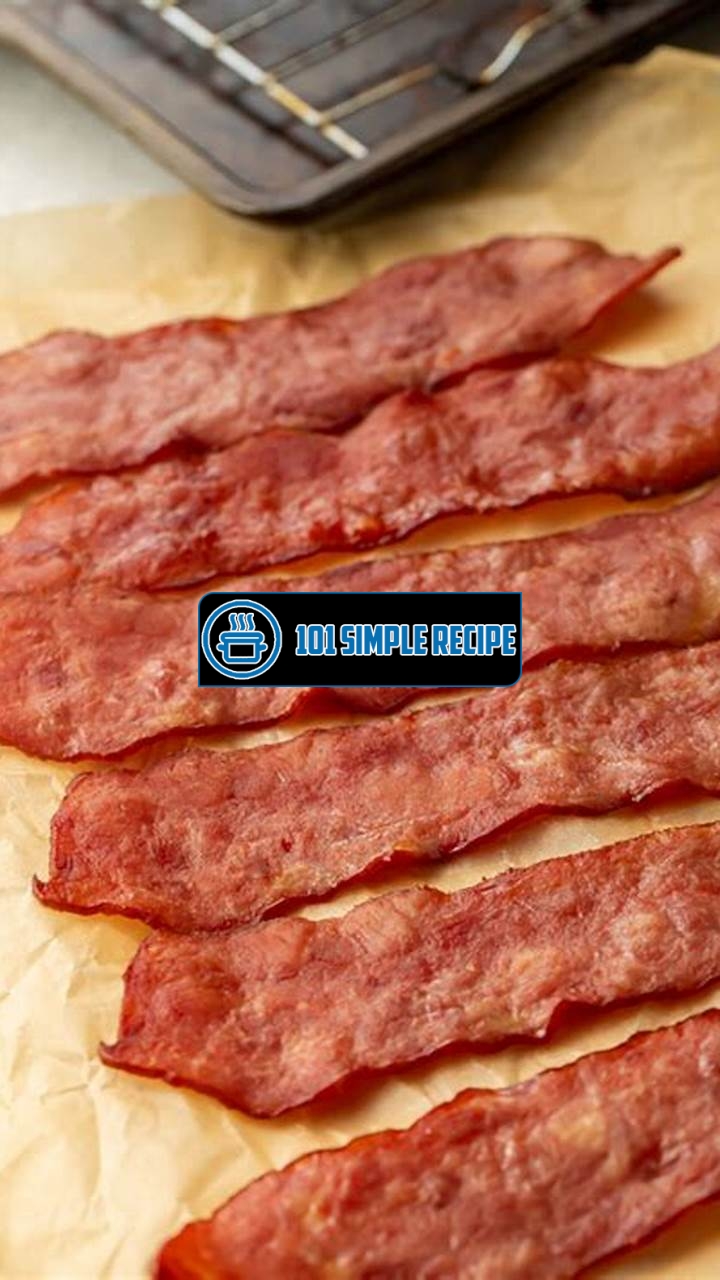If you’re a fan of the smoky, irresistible flavor of bacon but want a healthier alternative, look no further! Mastering the Art of Turkey Bacon Baking is the ultimate guide to creating delicious and crispy bacon from turkey. In this article, we will explore the secrets behind achieving the perfect texture and taste for your turkey bacon, as well as share some mouthwatering recipes that will leave you craving for more. So grab your apron and get ready to elevate your cooking skills with this tasty poultry twist on a breakfast classic. ✨

Understanding Turkey Bacon
Turkey bacon has gained popularity in recent years as a healthier alternative to traditional bacon options. It is made from the meat of turkey, specifically the turkey thigh, which is seasoned, cured, and then sliced into thin strips. While it shares the name “bacon” with its pork counterpart, there are significant differences in taste, texture, and cooking methods.
What is Turkey Bacon?
Turkey bacon is a type of bacon made from turkey meat instead of pork. It is often marketed as a healthier choice due to its lower fat content. The meat used in making turkey bacon comes from the turkey thigh, which is generally a leaner cut compared to pork belly. This makes turkey bacon a popular option for those who are watching their fat intake or follow a specific dietary regimen.
Nutritional Differences between Turkey Bacon and Pork Bacon
When it comes to the nutritional profile, there are noticeable differences between turkey bacon and pork bacon. Turkey bacon tends to have lower fat, calories, and cholesterol compared to pork bacon. However, it also has lower protein content. On the other hand, pork bacon is higher in fat, calories, and cholesterol but contains more protein.
To put it into perspective, a typical serving of turkey bacon (about 3 slices) contains around 100 calories and 7 grams of fat, while the same serving of pork bacon has approximately 140 calories and 12 grams of fat. It is important to note that these numbers can vary depending on the brand and specific product.
Cooking Tips for Turkey Bacon
When it comes to cooking turkey bacon, there are a few tips to keep in mind to achieve the best results.
- Cooking Time: Turkey bacon tends to cook faster than pork bacon due to its lower fat content. It is recommended to start checking for doneness around 8-10 minutes of cooking time.
- Cooking Methods: Turkey bacon can be cooked in various ways, including frying, baking, or microwaving. Baking is a popular method that allows the bacon to become crispy without excessive grease. To bake turkey bacon, preheat your oven to 400°F (200°C) and arrange the strips on a baking sheet lined with parchment paper. Bake for 10-12 minutes, or until the bacon reaches your desired level of crispness.
- Storage: Once cooked, you can store leftover turkey bacon in an airtight container in the refrigerator for up to 4 days. It can be reheated in the microwave or oven before consuming.
Remember, cooking times may vary, so it is essential to keep an eye on the bacon as it cooks to prevent it from burning or becoming too crispy.
By understanding what turkey bacon is, its nutritional differences compared to pork bacon, and some cooking tips, you can confidently master the art of turkey bacon baking. Whether you are looking for a healthier bacon option or simply wanting to try something new, turkey bacon offers a flavorful and nutritious choice. So go ahead, give it a try and enjoy the deliciousness that turkey bacon has to offer!
Baking Turkey Bacon
When it comes to preparing turkey bacon, baking is a popular method that offers several benefits over frying. Not only does baking turkey bacon provide a healthier alternative, but it also allows you to enjoy crispy and delicious strips without the excess grease. In this section, we will explore the benefits of baking turkey bacon and provide you with a step-by-step process to master this art.
Benefits of Baking Turkey Bacon
There are numerous benefits of choosing to bake turkey bacon instead of frying it. Firstly, baking reduces the amount of fat that is retained in the bacon, making it a much healthier option. By baking turkey bacon, you can significantly lower the calorie and saturated fat content, which is crucial for those watching their diet or maintaining a healthy lifestyle. Additionally, baking also helps to preserve the natural flavors of the turkey bacon, ensuring a more enjoyable eating experience.
Another advantage of baking turkey bacon is that it eliminates the need for added oils or fats. Unlike frying, where you often have to use additional oil to prevent the bacon from sticking to the pan or becoming too dry, baking requires no such extra measures. This not only saves you calories but also makes the cooking process much simpler and hassle-free.
Baking turkey bacon also offers the convenience of easy cleanup. Unlike frying, which can result in splatters and grease stains all over your stovetop, baking requires minimal cleanup. Simply line a baking sheet with parchment paper or aluminum foil, place the turkey bacon on the sheet, and bake. Once done, you can easily discard the used parchment paper or foil, leaving you with a clean and mess-free kitchen.
Preparation and Temperature for Baking Turkey Bacon
Now that you are aware of the benefits, it’s time to learn the step-by-step process of baking turkey bacon. To start, preheat your oven to 400°F (200°C) to ensure even cooking. Then, line a baking sheet with parchment paper or aluminum foil to prevent the bacon from sticking to the pan.
Next, arrange the turkey bacon strips on the baking sheet, making sure to leave a little space between each strip. This allows the hot air to circulate, ensuring that the bacon cooks evenly and becomes crispy.
Place the baking sheet in the preheated oven and bake the turkey bacon for 12-15 minutes, or until it reaches your desired level of crispiness. It’s important to keep an eye on the bacon as it can quickly go from crispy to burnt.
Once the turkey bacon is done baking, carefully remove it from the oven using oven mitts or tongs. Transfer the bacon to a plate lined with paper towels to absorb any excess grease. Allow it to cool for a few minutes before serving, and enjoy the delicious and crispy results.
Tips for Achieving Crispy Turkey Bacon
To ensure that your turkey bacon turns out perfectly crispy, here are a few tips to keep in mind:
- Cooking time may vary depending on the thickness of the bacon, so it’s important to keep a close eye on it during the baking process.
- If you prefer your bacon extra crispy, you can broil it for an additional 1-2 minutes at the end of the baking time.
- For added flavor, you can sprinkle some black pepper or your favorite herbs and spices on the bacon before baking.
- Allow the turkey bacon to cool for a few minutes before serving to ensure that it becomes crispier.
In conclusion, baking turkey bacon is a healthier alternative to frying and offers a range of benefits. With a simple preparation process and the right temperature, you can achieve crispy and delicious turkey bacon strips without the excess grease. Remember to keep an eye on the cooking time and follow these tips for the best results. So why not give baking a try and master the art of turkey bacon baking today?
Factors Affecting Cooking Time
Turkey bacon is a popular alternative to traditional bacon, and mastering the art of baking it requires an understanding of the various factors that can influence its cooking time. From the thickness of the turkey bacon to oven variations and preferred texture, each element plays a crucial role in achieving the perfect crispiness. Let’s delve into these factors and how they impact the cooking time of your turkey bacon.
Thickness of Turkey Bacon
The thickness of the turkey bacon is one of the key factors that can affect the cooking time. Thicker slices will require more time in the oven to cook evenly and develop a crispy texture. On the other hand, thinner slices will cook faster and may become overly crispy if left in the oven for too long. To ensure the best results, it is recommended to adjust the cooking time based on the thickness of the turkey bacon.
Tip: Use a ruler or measuring tape to determine the thickness of your turkey bacon slices before baking.
Oven Variations and Cooking Time
Another factor to consider when baking turkey bacon is the variation in oven temperatures. Every oven is unique, and even small variations in temperature can have a significant impact on the cooking time. It is advisable to preheat your oven to the recommended temperature before placing the turkey bacon inside. Additionally, using an oven thermometer can help ensure your oven is accurately set to the desired temperature.
Note: It is essential to monitor the turkey bacon closely during the cooking process to avoid burning or undercooking due to variations in oven temperatures.
Preferred Texture and Its Impact on Cooking Time
The preferred texture of turkey bacon can also influence the cooking time. Some individuals prefer their bacon to be crispy, while others prefer a more chewy texture. Achieving the desired texture requires careful monitoring and adjusting the cooking time accordingly.
Tip: For crispy turkey bacon, increase the cooking time slightly. Conversely, if you prefer a chewier texture, reduce the cooking time and keep a close eye on the bacon.
In conclusion, mastering the art of turkey bacon baking necessitates an understanding of the various factors that affect its cooking time. Consider the thickness of the bacon, variations in oven temperatures, and preferred texture to achieve your desired results. By paying attention to these factors and making minor adjustments, you can create perfectly cooked turkey bacon every time.
Recommended Cooking Times for Turkey Bacon
When it comes to cooking turkey bacon, it’s important to know the recommended cooking times to achieve the perfect result. Whether you prefer your turkey bacon thinly sliced, thickly sliced, crispy, or chewy, these guidelines will help you master the art of turkey bacon baking.
Cooking Time Chart for Thinly Sliced Turkey Bacon
If you have thinly sliced turkey bacon, the cooking time will be shorter compared to thickly sliced bacon. The cooking time for thinly sliced turkey bacon is typically around 10 to 12 minutes in a preheated oven at 400°F (200°C). However, it’s always a good idea to keep an eye on it to avoid overcooking or undercooking. Remember, each oven may vary, so tweak the cooking time accordingly.
Tip: To achieve crispier bacon, you can increase the cooking time by a couple of minutes. Just be cautious not to burn it.
Cooking Time Chart for Thickly Sliced Turkey Bacon
If you have thickly sliced turkey bacon, it will require a bit more time to cook compared to thinly sliced bacon. The cooking time for thickly sliced turkey bacon is typically around 12 to 15 minutes in a preheated oven at 400°F (200°C). Again, keep an eye on it to ensure it doesn’t become too crispy or burnt.
Tip: For a chewier texture, you can decrease the cooking time slightly. However, avoid undercooking it as it may not reach the desired level of doneness.
Adjustments for Crispy or Chewy Turkey Bacon
If you prefer your turkey bacon to be extra crispy or chewy, you can make some adjustments to the cooking time.
To achieve crispy turkey bacon:
- Increase the cooking time by a few minutes.
- Place the bacon on a wire rack instead of directly on the baking sheet to allow for better airflow and crispness.
- If the bacon is still not as crispy as you’d like, you can broil it for a minute or two, keeping a close eye on it to avoid burning.
To achieve chewy turkey bacon:
- Decrease the cooking time slightly to ensure it doesn’t become overly crispy.
- Consider reducing the oven temperature to 375°F (190°C) for a longer but gentler cooking process.
- If necessary, you can brush a thin layer of maple syrup or honey onto the bacon before baking to add some sweetness and enhance the chewiness.
Note: It’s always important to follow the recommended cooking times, but also trust your instincts and use visual cues to determine the doneness of your turkey bacon. Adjust the cooking time and temperature based on your preferences and oven’s performance.
With these cooking time guidelines and adjustments, you’re now equipped to bake the perfect turkey bacon every time. Enjoy the mouthwatering aroma and delicious flavor of your favorite bacon alternative!
Tips for Perfectly Baked Turkey Bacon
When it comes to baking turkey bacon, it’s all about achieving that perfect balance of crispiness and tenderness. With a few tips and tricks up your sleeve, you can master the art of baking turkey bacon and enjoy a delicious and healthier alternative to traditional bacon. Let’s dive into some key techniques that will elevate your turkey bacon game.
Properly Preheating the Oven
To ensure even cooking and optimal texture, it’s essential to preheat your oven properly before baking turkey bacon. Set the temperature to 400°F (200°C) and allow the oven to fully heat up. This ensures that the bacon cooks evenly from all sides, giving you a consistent result every time.
Pro Tip: Make sure the oven is fully preheated before you place the bacon in, as this will help prevent any sogginess or uneven cooking.
Using a Wire Rack for Better Air Circulation
One of the secrets to perfectly baked turkey bacon lies in using a wire rack. Placing the bacon on a wire rack allows for better airflow and ensures that the bacon cooks evenly, with no areas getting overly crispy or burnt. The wire rack allows any excess grease to drip down, leaving you with bacon that’s crispy and delicious.
Pro Tip: Line the baking sheet underneath the wire rack with aluminum foil to catch any drippings and make clean-up a breeze.
Monitoring Turkey Bacon during the Baking Process
Monitoring the cooking process is crucial when baking turkey bacon. Keep a close eye on the bacon as it cooks to prevent it from becoming overly crispy or burnt. The cooking time can vary depending on the thickness of the bacon slices, so it’s important to check for doneness at regular intervals. This ensures that you achieve that perfect balance between crispy and chewy.
Pro Tip: Start checking the bacon after around 10 minutes of baking. You’ll know it’s ready when it has turned golden brown and has a slightly crispy texture.
Additionally, if you prefer your bacon extra crispy, you can leave it in the oven for a few more minutes, but be careful not to overcook it.
By following these tips, you can become a master at baking turkey bacon and enjoy a healthier and flavorful alternative to traditional bacon. So preheat your oven, set up your wire rack, and start monitoring that delicious turkey bacon as it sizzles away. Bon appétit!
Thanks for reading our article on how long to bake turkey bacon! We hope you found the information helpful and that it will assist you in achieving crispy perfection with your bacon. If you have any more questions or if there’s anything else you’d like to know about cooking turkey bacon, feel free to visit our website again in the future. Happy cooking and enjoy your delicious turkey bacon!
Frequently Asked Questions
Here are some frequently asked questions about how long to bake turkey bacon:
| No. | Questions | Answers |
|---|---|---|
| 1 | How long should I bake turkey bacon? | You should bake turkey bacon at 400°F for about 15-20 minutes, or until it reaches your desired level of crispness. |
| 2 | Should I preheat the oven before baking turkey bacon? | Yes, it’s recommended to preheat the oven to 400°F before baking turkey bacon for best results. |
| 3 | Do I need to flip the turkey bacon while baking? | No, there’s no need to flip the turkey bacon while it’s baking. Just place it on a baking sheet lined with parchment paper and let it cook until crispy. |
| 4 | Can I use the same baking time for thick-sliced turkey bacon? | Thick-sliced turkey bacon may require a slightly longer baking time. Start with the recommended time and check the bacon periodically until it reaches your desired crispness. |
| 5 | Should I drain the excess grease from the turkey bacon after baking? | Yes, it’s a good idea to place the baked turkey bacon on a paper towel-lined plate to absorb any excess grease before serving. |
| 6 | Can I store leftover turkey bacon? | Yes, you can store leftover turkey bacon in an airtight container in the refrigerator for up to 3 days. To reheat, simply place it in the oven or microwave until warmed through. |
Closing Thoughts
We hope this article has provided you with all the information you need to bake turkey bacon to perfection. Remember to preheat your oven, use the recommended temperature and baking time, and don’t forget to adjust for thicker slices if needed. Feel free to browse our website for more delicious recipes and cooking tips. Thanks for reading!
Jump to Recipe
Turkey Bacon Recipe

Learn how long to bake turkey bacon to achieve crispy perfection. Find step-by-step instructions and helpful tips for delicious results.
- 8 slices of turkey bacon
- parchment paper
- Preheat the oven to 400°F (200°C) and line a baking sheet with parchment paper.
- Arrange the turkey bacon slices in a single layer on the prepared baking sheet.
- Bake the turkey bacon in the preheated oven for 15-20 minutes, or until it reaches your desired level of crispness.
- Carefully remove the baked turkey bacon from the oven and place it on a paper towel-lined plate to drain any excess grease.
- Serve the crispy turkey bacon hot and enjoy!
- If you have any leftovers, store them in an airtight container in the refrigerator for up to 3 days.






